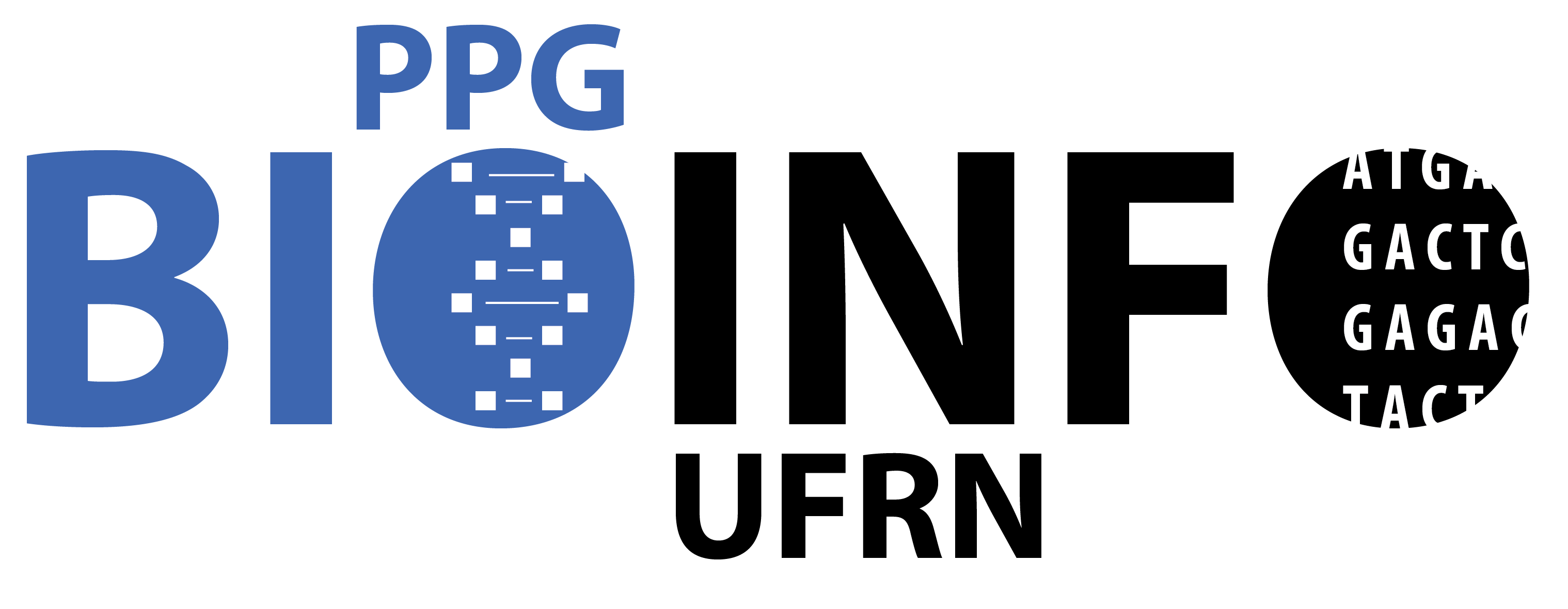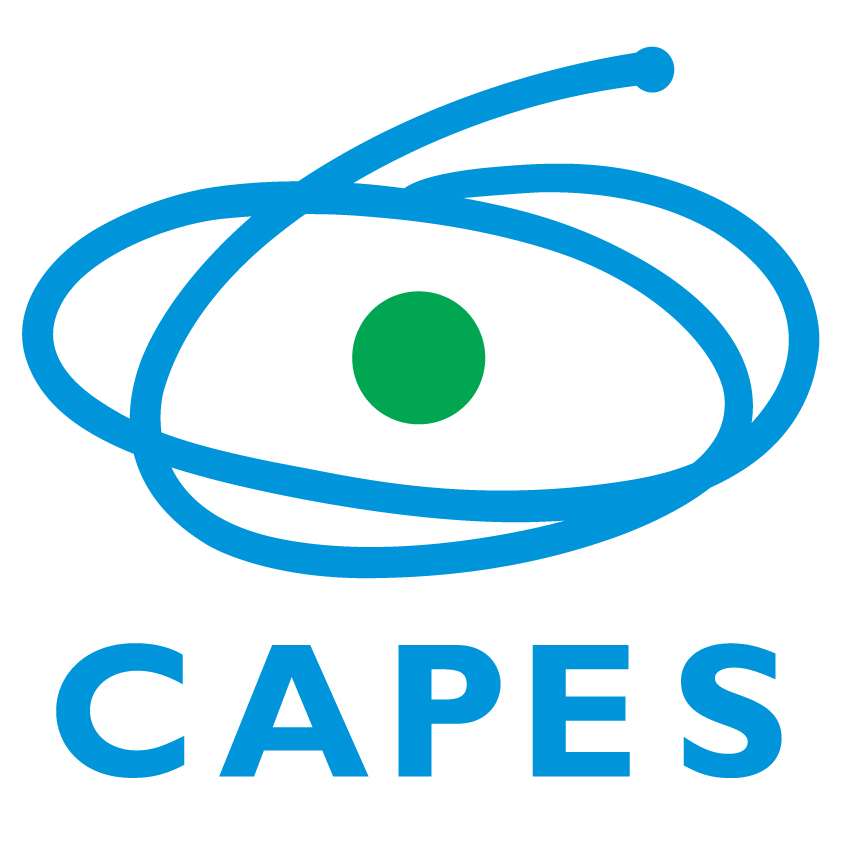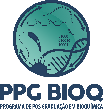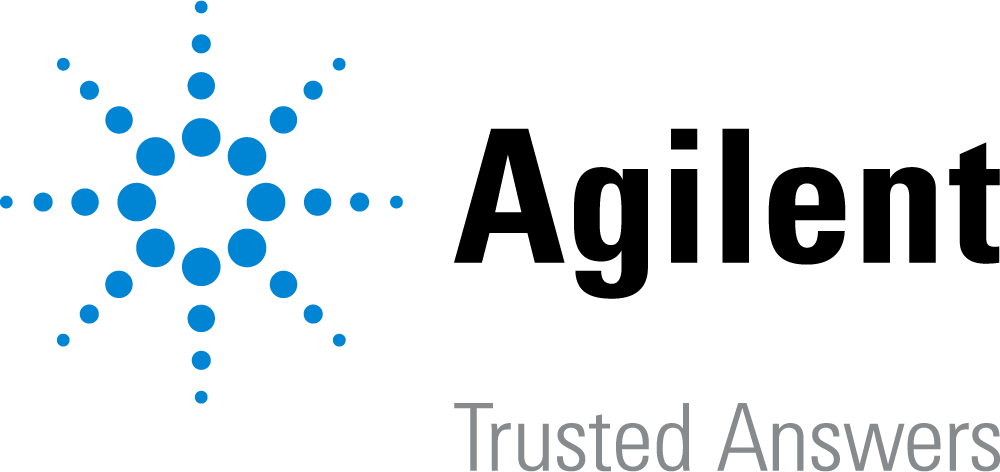Best Moments
About the Forum
The event will provide discussions about the perspectives and advances in bioinformatics research through keynote speeches, panels, forums and poster sessions to construct an open environment where leading international and national scientists in the field can interact with students, entrepreneurs and policymakers.
Program
Opening
Conference :
R / Bioconductor for the open-source analysis and comprehension of high-throughput genomic data
Speaker : Martin Morgan, Roswell Park Comprehensive Cancer Center
Chair : Rodrigo Dalmolin, UFRN.
Symposium:
Bioinformatics applied to Genomics/Proteomics
Paving the way for the combined analysis of multiple proteomic datasets
Gustavo A. de Souza, UFRN
Bioinformatics/Genomics and the peopling of South America
André M. Ribeiro dos Santos, UFPA
The use of genomics tools to unravel the Amazonian biodiversity
Guilherme Oliveira, Intituto Tecnológico Vale
Chair : Tetsu Sakamoto, UFRN
Coffee Break + Poster Session
Conference :
Modelling collective cell behaviour in biology
Speaker : Philip Maini, Oxford University.
Chair : Beatriz Stransky, UFRN.
Forum:
Bioinformatics in the Industry.
Eduardo Emrich, BioMinas
David Santos Marco Antonio, Grupo Fleury
Raphael Bessa Parmigiani, IdenGene Medicina Diagnóstica
Chair : Sandro J. de Souza, UFRN
End of Day
Technical lecture:
Integrated Biology analysis as a bioinformatic tool used to integrate multiomics data to early detect molecular alteration in cancer diseases
Speaker : Maurício Marquers, LCMS Product Specialist, Agilent Technologies Brasil
Conference :
Dissecting oncogenic EGF receptor signaling in-vivo by quantitative interaction proteomics and phosphoproteomics
Speaker : Jesper Olsen, University of Copenhagen, Denmark
Chair : Gustavo A. de Souza, UFRN
Symposium:
Bioinformatics applied to Systems Biology
Transcriptional Analisys based on PPI Networks
Rodrigo Dalmolin, UFRN
Chromatin accessibility and regulon activity patterns in breast cancer
Mauro Castro, UFPR
The challenges for modeling and simulation in bioinformatics
César Renno Costa, UFRN
Chair : Beatriz Stransky, UFRN
Coffee Break
Conference :De Novo Origination as Evolutionary Mechanism of Protein Diversity: The Standard and Evidence
Speaker: Manyuan Long, University of Chicago.
Chair: Sandro J. de Souza, UFRN
Forum :
Bioinformatics and Big Data
Samuel X. de Souza, UFRN
Vinicius Maracajá Coutinho, University of Chile
Pedro Mário Cruz e Silva, NVIDIA
Chair: Renan Cipriano Moioli
End of Day
Conference :
The principles of neurorehabilitation: delivering brain repair at the confluence of brain theory, virtual reality and artificial intelligence
Speaker: Paul Verschure, University of Barcelona, Spain
Chair: César Renno Costa
Symposium:
Bioinformatics in Health
Circulating tumor DNA as a tool to monitor treatment response and antecipate tumor progression
Dirce Carraro, AC Camargo Cancer Center
The subvertion of the host metabolism in Leishmania infantum infection
Selma Jerônimo, UFRN
Assessing the structural impacts of cancer-associated mutations using new approaches
João Paulo Matos, UFRN
Chair: Lucymara Agnez
Light Lunch + Poster Session
Conference :
Translational Informatics: from clinical management to healthcare
Speaker: Bairong Chen, Institute of Systems Genetics, Sichuan University, China
Chair: Sandro J. de Souza, UFRN
Forum:
Innovation in Natal: a Bioinformatics Perspective
Ivonildo do Rego, UFRN
Daniel Diniz, UFRN
Augusto Schrank, UFRGS
Chair: Anderson Paiva Cruz, UFRN
Closing
Speakers
Bairong Shen
Institute of Systems Genetics, Sichuan University, ChinaPh.D by the Fudan University in Shanghai, China, Dr. Shen got postdoctoral training at the University of Tampere in Finland, and was recruited by the Soochow University, China as a professor, where he is also the Director of the Center for Systems Biology. His research interests include bioinformatics studies and systems biology in complex diseases, particularly in the discovery of biomarkers and in the study of molecular mechanisms for cancer based on computational analysis and network modeling.
Jespen Olsen
University of Copenhagem, DenmarkPh.D. in Molecular Biology at the University of Southern Denmark, and post-doctor at the Department of Proteomics and Signal Transduction at the Max Planck Institute for Biochemistry, Germany, both under the supervision of the Proteomics field world reference Matthias Mann. He is vice director of the Novo Nordisk Foundation Center for Protein Research, full Professor at Faculty of Health and Medical Sciences at the University of Copenhagen, Denmark. Olsen´s major scientific focus area is quantitative, high-resolution mass spectrometry-based proteomics with specific emphasis on mass spectrometric technology developments and biological applications.
Manyuan Long
University of Chicago, USAPh.D in Genetics at the University of California, USA, and post-doctor at the Departments of Molecular and Cellular Biology and Organismic and Evolutionary Biology at Harvard University, USA, Dr. Long works at the Department of Ecology and Evolution at the University of Chicago, USA as the Edna K. Papazian Distinguished Service Professor. World-wide recognized as pioneer and leader of scientific research in the area of origin and evolution of new genes, his discovers have helped shaping the new chapters and sections about new genes evolution in major textbooks of evolutionary biology.
Martin Morgan
Bioconductor / Roswell Park Comprehensive Cancer Center, USAPh.D. in Evolutionary Genetics at the University of Chicago, USA, Dr. Morgan is currently the director of the R / Bioconductor Project and a professor at the Roswell Park Comprehensive Cancer Center, USA. His interests include statistical methods in computational biology, analysis and comprehension of 'next generation' high-throughput sequence data, integrative analysis of large-scale multiple ‘omics data sets and interference of single-cell evolutionary processes in cancer development.
Paul Verschure
University of Barcelona, SpainPh.D in Psycology, Dr. Verschure is a Professor at the Catalan Institute of Advanced Studies and Director of the laboratory of Synthetic Perceptive, Emotive and Cognitive Systems at the University of Barcelona, Spain. His research interests include computational models of neuronal mechanisms underlying perception, cognition, emotion and behavior, robotics and avatars as artificial bodies for neuronal models, and to the enhancement of the quality of life.
Philip Maini
Oxford University, UKPh.D in Mathematical Biology at the Oxford University, UK, Dr. Maini was appointed Professor of Mathematical Biology by Recognition of Distinction in the same institution, where he had been the Director of Wolfson Centre for Mathematical Biology. Maini´s research interests include mathematical modelling of tumours, wound healing and embryonic pattern formation, and the theoretical analysis of these models. With over 300 publications, he has held several visiting professor positions worldwide and is a very awarded scientist, listed in "The World's Most Influential Scientific Minds 2014" (Thomson Reuters) and winner of the Arthur T. Winfree Prize from the Society of Mathematical Biology in 2017.
Augusto Schrank
Federal University of Rio Grande do Sul, BrazilPh.D in Molecular Biology at the University of Manchester, UK, he is a Full Professor at the Federal University of Rio Grande do Sul, Brazil. He has vast experience in Genetics, mainly in pathogenicity determinants and infection mechanisms, genomics, differential expression analysis and in genetic transformation systems to construct functional mutants in fungi.
Anderson Paiva Cruz
Federal University of Rio Grande do Norte, BrazilPhD in Computer Engineering from the Federal University of Rio Grande do Norte, Brazil, where currently he is a professor of the Digital Metropolis Institute, acting in Technological Innovation and Fuzzy Theory. He is the director of the Digital Metropolis Park and president of the Potiguar Network of Incubators and Parks.
Cesár Renno-Costa
Federal University of Rio Grande do Norte, BrazilPh.D in Information Technology and Communication with emphasis in Computational Neuroscience at the University Pompeu Fabra, Spain and postdoctoral researcher at the Brain Institute of Federal University of Rio Grande do Norte. Currently is Associate Professor in Bioinformatics at the Digital Metropolis Institute of the Federal University of Rio Grande do Norte, member of the Bioinformatics Multidisciplinary Environment, and is a collaborator of the European projects Synthetic Forager and Goal Leaders, of the American project BRAIN and member of the Convergent Science Network for Biomimetics. His research focus in the study of natural computational principles using as methodology the modeling of biological systems, their simulation in computational systems using advanced numerical methods and the implementation in the control of real artificial agents.
David Santos Marco Antonio
Grupo FleuryPhD in Genetics at the University of São Paulo, he has experience in Genetics and Bioinformatics, Metagenomics, Epigenomics of Cancer. Currently, he is a Scientific Advisor at the Fleury Group.
Dirce Carraro
A.C. Camargo Cancer CenterPhD and post-doctor in Biological Sciences at the University of São Paulo, Brazil, Dr. Carraro was senior researcher at Ludwig Institute for Cancer Research, and is a Scientist at A.C. Camargo Cancer Center, in Brazil, where she leads the Genomics and Molecular Biology Laboratory. Her research focus in the comprehension of tumors (breast, prostate and Wilms tumor) biology, and she develops projects related to identification of germline mutations in genes susceptible to cancer, and the application of tools to identify new genes associated with hereditary cancer syndromes.
Eduardo Emrich
BiominasGeneral manager and manager of operations of Biominas, a company dedicated to create and develop biobusiness in Brazil, working with incubation, seed capital investment and consulting services. He is responsible for negotiation of strategic partnerships in Brazil and abroad, scouting, analysis of projects and products, new business development, and investment in startup companies.
Guilherme Corrêa de Oliveira
Instituto Tecnológico ValePh.D in Molecular Biology at the Texas A&M University, USA and post-doctor at the René Rachou Research Center of the Oswaldo Cruz Foundation in Minas Gerais,Brazil, currently he is a researcher of the Instituto Tecnológico Vale where he leads the group of Biodiversity and Biotechnology and Professor of the Bioinformatics Program at the federal University of Minas Gerais. His area of expertise is molecular and genomic studies of Amazonian biodiversity.
Gustavo Antonio de Souza
Federal University of Rio Grande do Norte, BrazilPh.D in Cellular and Molecular Biology at the University of São Paulo,Brazil, and post-doctor at the Department of Proteomics and Signal Transduction at the Max Planck Institute for Biochemistry, Germany. He worked as a Principal Investigator at the University of Oslo, Norway, and currently is Adjunct Professor at the Biochemistry Department of the Federal University of Rio Grande do Norte and member of the Bioinformatics Multidisciplinary Environment. His research focus on the use of proteomics and bioinformatics for characterization of new spling events and new genome coding regions.
Ivonildo do Rego
Federal University of Rio Grande do Norte, BrazilPh.D in Electrical Engineering at the Federal University of Rio Grande do Norte, Brazil, and post-doctor at the Texas A&M University, USA, he is currently a Professor at the Federal University of Rio Grande do Norte. Dr. Rego is a former Dean of the university and is the Director of the Digital Metropolis Institute, an academic unit whose organizational structure encompasses initiatives from the public, private and academic sectors.
João Paulo Matos Santos Lima
Federal University of Rio Grande do Norte, BrazilPhD in Biochemistry at the Federal University of Ceará, Brazil, Dr. Lima is currently Associate Professor at the Department of Biochemistry of the Federal University of Rio Grande do Norte, where he is also vice-coordinator of the Postgraduate Program in Bioinformatics and member of the Bioinformatics Multidisciplinary Environment. His main research lines are: Bioinformatics / Structural Bioinformatics (Analysis of Genomes / Transcriptomes, In silico Analysis of Gene Interaction Networks, Data Mining, Computational Modeling of Protein Structures); Molecular Phylogeny and Evolution of Genes and Metabolic Routes; Biochemistry and Antioxidant Metabolism in Plants.
Mauro Castro
Federal University of Paraná, BrazilMD - Ph.D. in Biochemistry at the Federal University of Rio Grande do Sul, Brazil and post- doctor at the Cancer Research UK, University of Cambridge. Currently he is a professor at the Federal University of Paraná, Brazil with research interests in functional genomics and gene expression networks, quantitative and systems biology, computational, statistical and mathematical methods, analysis and integration of biological data.
Pedro Mário Cruz e Silva
NVIDIAMathematician, PhD in Computer Science, and MBA in Business Management, Dr. Cruz e Silva has vast experience in deep learning, high performance computing, and machine learning. Currently, he is Solutions Architect Manager - Latin America at NVIDIA, where he leads the Artificial Intelligence and Deep Learning technical engagements with customers team.
Raphael Bessa Parmigiani
IdenGene Medicina DiagnósticaPhD in Oncology from Fundação Antônio Prudente and postdoctoral fellow at the Memorial Sloan-Kettering Cancer Center in New York, USA, he also worked as a researcher at the Ludwig Institute for Cancer Research in São Paulo. Dr Parmigiani has experience in the field of Human Genetics, with emphasis on Molecular Biology and Cancer Genomics, and currently is a partner-director at the laboratory IdenGene Medicina Diagnóstica.
Renan Cipriano Moioli
Federal University of Rio Grande do Norte, BrazilPh.D. in Cognitive Sciences from the Center for Computational Neuroscience and Robotics at the University of Sussex, UK, currently he is a professor at Digital Metropolis Institute of the Federal University of Rio Grande do Norte. With experience in Electrical Engineering and Computer Science, with emphasis on computer intelligence, machine learning, signal processing, information theory and autonomous robotics, Dr. Moioli research focus on development of and search for computational intelligence tools in the context of neuroengineering, with applications to health and other fronts of the productive sector.
Rodrigo Juliani Siqueira Dalmolin
Federal University of Rio Grande do Norte, BrazilPh.D. in Biological Sciences: Biochemistry at the Federal University of Rio Grande do Sul, Brazil, Dr. Dalmolin is currently Adjunct Professor at the Biochemistry Department of the Federal University of Rio Grande do Norte, and vice-coordinator of the Bioinformatics Multidisciplinary Environment. His research interests include evolution of biological networks, with emphasis on networks of protein-protein interactions and regulatory networks.
Samuel Xavier de Souza
Federal University of Rio Grande do Norte, BrazilPhD in Electrical Engineering at Katholieke Universiteit Leuven, Belgium, where Dr. de Souza also worked as Software / Hardware Engineer at the Interuniversity Center for Micro- and Nanoelectronics, and as a research consultant at the Flanders Supercomputing Center. Currently, he is a professor at the Department of Computer Engineering and Automation of the Federal University of Rio Grande do Norte, Brazil, and is also the coordinator of the Nucleus of High Performance Processing. His research interests include software energy efficiency, parallel systems efficiency and scalability, parallel algorithms and architectures and their applications.
Sandro José de Souza
Federal University of Rio Grande do Norte, BrazilPh.D. in Biochemistry from the University of São Paulo, and Pew Latin American Fellow at Harvard University, Dr. de Souza was one of the pioneers of genomics and bioinformatics in Brazil. He was an associate member of the Ludwig Institute for Cancer Research, elected by the World Economic Forum as a Young Global Leader in 2009, and Tinker Visiting Professor at the University of Chicago, USA. Currently, he is a professor of the Brain Institute of the Federal University of Rio Grande do Norte, Brazil, where he coordinates the Bioinformatics Multidisciplinary Environment (BioME), with the mission to promote bioinformatics at the regional and national scenario, acting in the levels of, teaching, research, service sector, and corporate program.
Selma Jerônimo
Federal University of Rio Grande do Norte, BrazilMD – Ph.D in Molecular Biology at the Federal University of São Paulo, Brazil, and post-doctor at the University of Virginia, USA, she is a Professor at the Biochemistry Department and Director of the Tropical Medicine Institute of the Federal University of Rio Grande do Norte, Brazil and at the University of Virginia and University of Iowa, USA. Her research focus on the study of complex diseases, including pre-eclampsia and infectious and parasitic diseases, aiming to understand the susceptibility to disease developing.
Vinicius Maracajá Coutinho
University of ChilePhD in Bioinformatics from the University of São Paulo, he is currently President and Researcher at the Vandique Institute (Brazil) and Assistant Professor at the University of Chile, where he develops research in the area of genomics and bioinformatics, and is engaged to the popularization of science, as well as in the development of software and databases of biological interest.
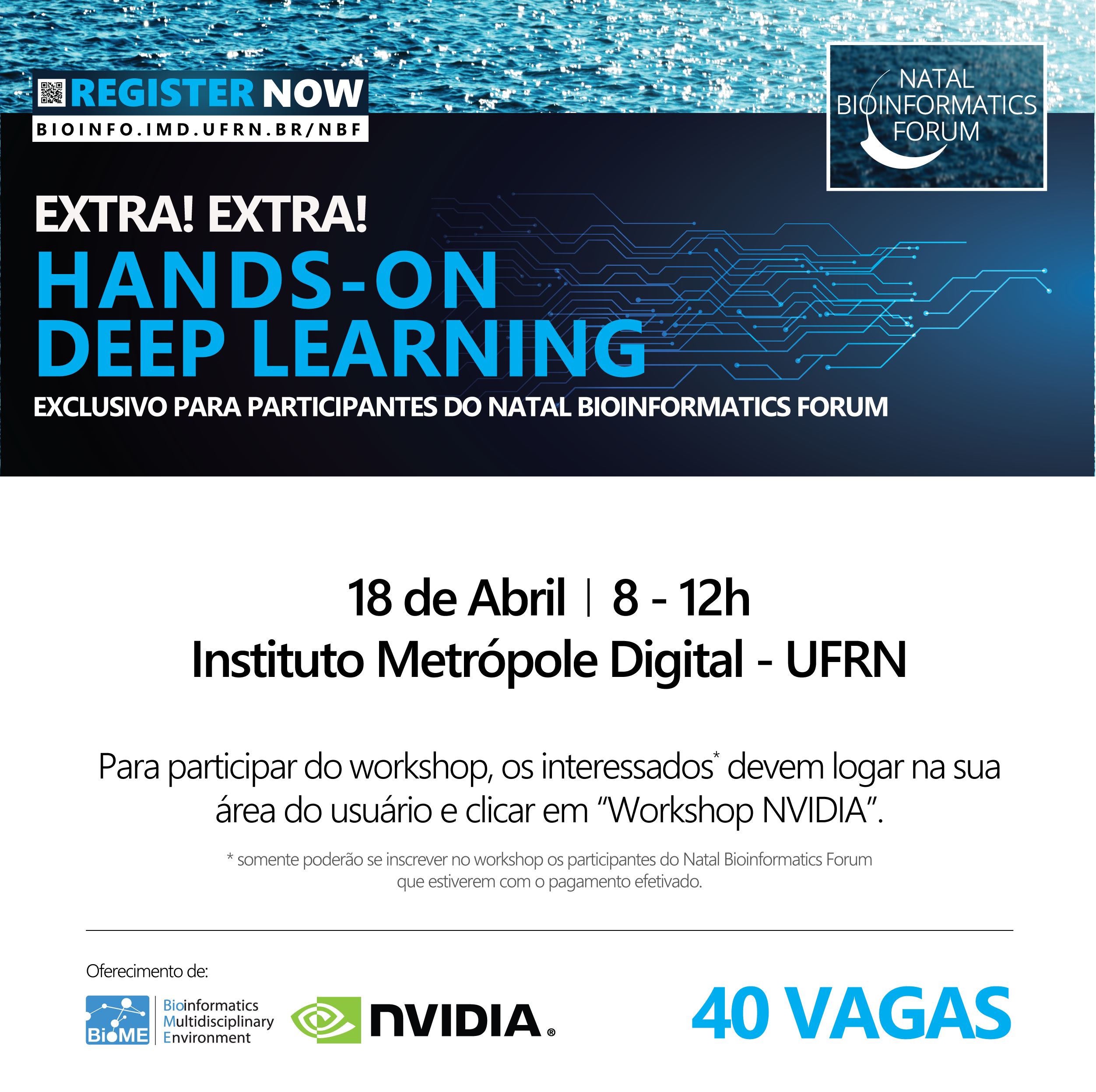
About the venue
The Forum will take place at Golden Tulip Ponta Negra Hotel in Natal - RN, Brazil. Natal's Ponta Negra neighbourhood is famous for its seafood, sandy beaches, and bustling nightlife. With gorgeous sea view and modern facilities, the hotel is located 3 minutes walk from the beach and 25km away from São Gonçalo do Amarante International Airport.
About Natal
Natal is the capital and largest city of Rio Grande do Norte state, located in northeastern Brazil. The city is located 2,227 km away from Brasília, the federal capital, and is the closest state capital of Brazil to Africa and Europe. Natal has several tourist attractions and is famous for its natural beauty (such as the crystalline waters of Maracajaú and the largest cashew tree in the world), for its historical monuments and buildings (such as the Forte dos Reis Magos, the Alberto Maranhão Theatre and Newton Navarro bridge) and for its beaches (such as Ponta Negra, Pipa and Genipabu). The city also boasts the second largest urban park in Brazil, Parque das Dunas.




